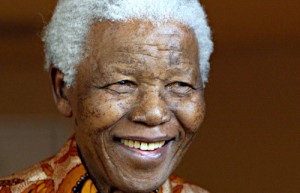JOHANNESBURG: Nelson Mandela’s long walk from apartheid prisoner to South African president remade a country and inspired the world.
Mandela died peacefully at home in Johannesburg aged 95 after spending months in critical condition following treatment for a lung infection.
Twenty-three years earlier, on February 11, 1990, Nelson Rolihlahla Mandela emerged, greying but unbowed, from 27 years detention for opposing the white-minority apartheid regime.
It was a defining moment of the 20th century.
In freeing the world’s most famous political prisoner, President FW de Klerk sent an unequivocal message: after centuries of subjugation, millions of other black South Africans would soon be free too.
Apartheid was over.
“I greet you all in the name of peace, democracy and freedom for all,” a 71-year-old Mandela said in his first public speech in 27 years. “I stand here before you not as a prophet, but as a humble servant of you, the people.”
Devoid of self-pity, he reached out to the same people who jailed him and who brutalized fellow blacks to preach “true reconciliation” in what was, and remains, a deeply scared country.
Four years after his release—and just a year after he received the Nobel Peace Prize—South Africans would vote in droves to elect Mandela the country’s first black president.
As that rarest of politicians, a leader imbued with moral force, Mandela was never likely to lose.
But his task in office was immense, nothing less than preventing a civil war.
He succeeded in preventing serious racial violence in part through his easy manner and mastery of symbolism.
Perhaps two of his finest moments as a reconciler came when he had tea with the widow of apartheid architect Hendrik Verwoerd and when he donned the Springbok rugby jersey to congratulate the mainly white team’s victory in the 1995 Rugby World Cup.
Mandela remains a unifying symbol in a country still riven by racial tensions and deep inequality.
Born in the village of Mvezo in one of South Africa’s poorest regions, the Transkei, on July 18, 1918, Rolihlahla Dalibhunga Mandela was the great-grandson of a Tembu king.
He was given his English name “Nelson” by a teacher at his school.
An activist since his student days at the University of Fort Hare, Mandela opened the first black law firm in Johannesburg in 1952, along with fellow activist Oliver Tambo.
He became commander-in-chief of Umkhonto we Sizwe (Spear of the Nation), the armed underground wing of the African National Congress, in 1961, and the following year underwent military training in Algeria and Ethiopia.
After more than a year underground, he was arrested and in 1964 sentenced to life in prison during the Rivonia trial where he delivered a speech that was to become the manifesto of the anti-apartheid movement.
Mandela was jailed on Robben Island for 18 years before being transferred in 1982 to Pollsmoor prison in Cape Town and later to Victor Verster prison in nearby Paarl.
Then, in 1989 hardline President P.W. Botha was replaced by the more conciliatory F.W. De Klerk.
A year later, De Klerk ordered Mandela’s release.
Mandela’s presidency, like that of US president Abraham Lincoln or British Prime Minister Winston Churchill, will not be remembered for legislative achievements.
He served only one five-year term, and after his retirement in 1999 he devoted his considerable energy—despite increasing physical frailty—to mediating conflicts, especially the war in Burundi.
In 1998, on his 80th birthday, Mandela, after having divorced his second wife Winnie Madikizela-Mandela, married Graca Machel, the widow of Mozambican President Samora Machel.
At age 83, he was diagnosed with prostate cancer and successfully underwent treatment. Throughout his life he suffered from respiratory ailments.
In May 2004, Mandela announced that he was scaling back his public schedule to enjoy “a much quieter life” with his family and friends.
Eight months later, Mandela convened the press at his home to announce that his only surviving son had died of AIDS in a bid to encourage more openness about the disease.
In January 2011 he suffered a lung infection, which recurred in late 2012 and again in late March.
President Benigno Aquino 3rd on Friday joined the world in mourning Mandela’s death.
In a statement, the President extended his “deepest condolences to the family of Mandela, the people of South Africa, and all men and women of peace and goodwill who mourn the passing of a truly great man,” on behalf of the entire Filipino people.
Former Sen. Edgardo Angara praised Mandela as “a true icon of peace and freedom.”
“His life exemplifies how patience, hard work and unwavering commitment are essential to achieving one’s utmost vision,” Angara said.
AFP and Catherine S. Valente


